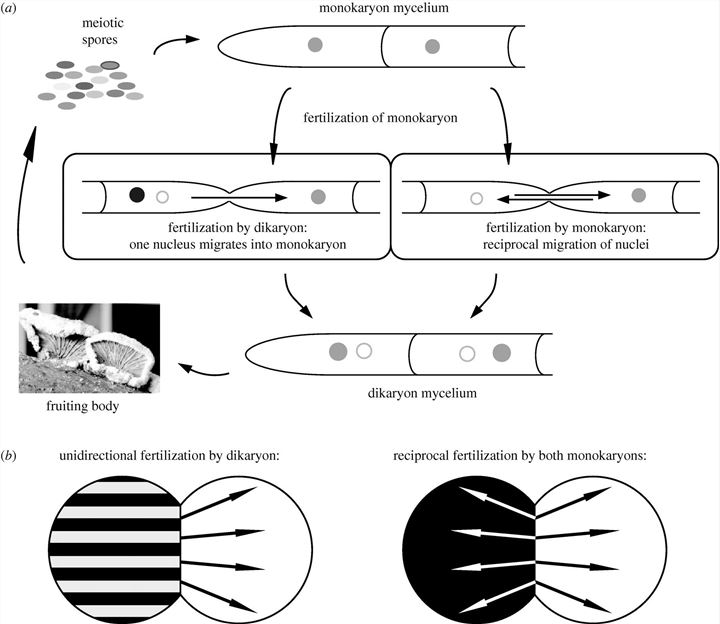Sexual selection is the natural selection component associated with mating success. In evolution, fitness is improved not by increasing survival or viability but by acquiring more or better mates. Sexual selection favors traits that increase the ability of individuals to acquire more mates than other individuals with whom they compete. It is well established that sexual selection is an important evolutionary force in plants and animals, but such traits are difficult to observe in fungi. Although fungi do not have different sexes, most filamentous fungi mate in a hermaphroditic manner with different sex roles. At present, sexual selection has been studied to occur mainlyin the Ascomycota and Basidiomycota phyla. Mushroom-forming fungi within the Ascomycota phylum are sexually productive through mutual migration of nuclei. They have a male-biased operational sex ratio (OSR), which helps to support the existence of sexual selection within the fungi.
 Fig. 1. Life cycle and fertilization of Schizophyllum commune. (Nieuwenhuis B P S, et al., 2011)
Fig. 1. Life cycle and fertilization of Schizophyllum commune. (Nieuwenhuis B P S, et al., 2011)
Services
Based on their knowledge of sexual selection in fungi, our experts specifically consider sexual selection in mushroom research to help our clients better understand their evolution and ecology. The main objectives of Lifeasible's focus on sexual selection in mushrooms are:
- Mushrooms are not fundamentally different from animals and plants in terms of mating and competition, and sexual selection can help clients explain various features of mushrooms that are difficult to explain by natural selection alone.
- The mushroom-forming Basidiomycota is a powerful model organism for experimental studies of the basic mechanisms of sexual selection. Because Basidiomycota mushrooms have a high diversity of life cycles, mating systems, and ecologies and can be easily manipulated in experiments.
Lifeasible can easily test the occurrence of sexual selection in mushroom-forming Basidiomycota model species by pairing mononucleosomes with fully compatible binucleosomes. In Basidiomycota, different basic elements of sexual selection theory can be easily controlled by selecting the right species or mutant, genetically modifying the strain, or manipulating the environment. In addition, the effect of density or OSR can be tested.
Advantages of Our Services
- Experiments can be conducted to determine how sexual selection affects adaptation.
- Changes in traits can be tested, either as a direct result of sexual selection or as a correlated trade-off for sexually selected traits.
- Can provide insight into traits that influence the evolution of hermaphrodites and dioeciousness.
Sexual selection can act on mushroom fungi. We performed evolutionary experiments with mushroom-forming Basidiomycota in which evolving cytosolic populations were repeatedly allowed to mate with non-evolving male characters receiving female mycelium. Furthermore, we provide predictions of sexual selection in mushrooms, and this theory of sexual selection can provide essential insights into the formative processes of fungal biology. If you are interested in our services, please contact us.
Reference
- Nieuwenhuis B P S, et al. (2011) Sexual selection in mushroom-forming basidiomycetes[J]. Proceedings of the Royal Society B: Biological Sciences. 278(1702): 152-157.
For research or industrial raw materials, not for personal medical use!


 Fig. 1. Life cycle and fertilization of Schizophyllum commune. (Nieuwenhuis B P S, et al., 2011)
Fig. 1. Life cycle and fertilization of Schizophyllum commune. (Nieuwenhuis B P S, et al., 2011) 